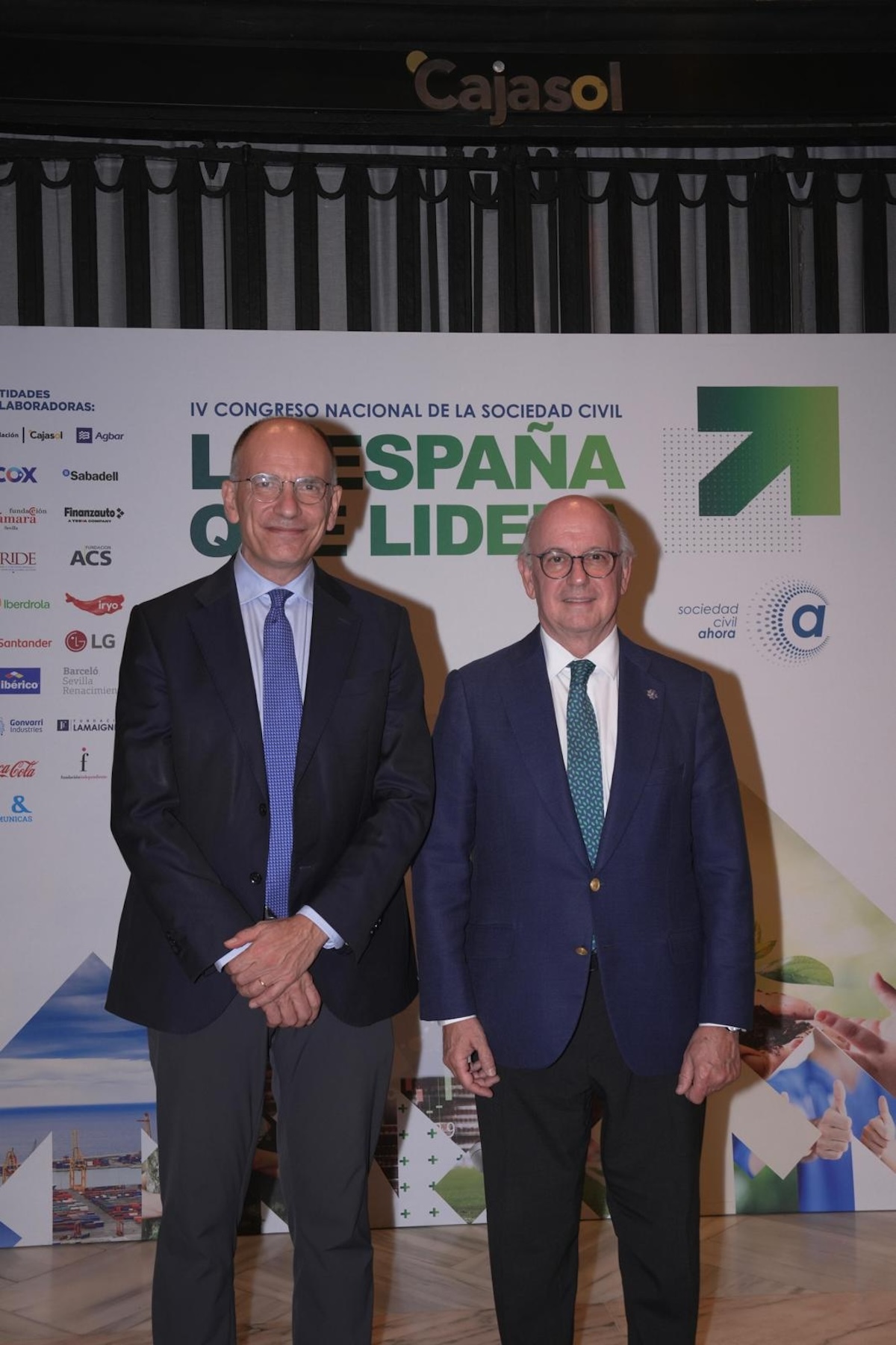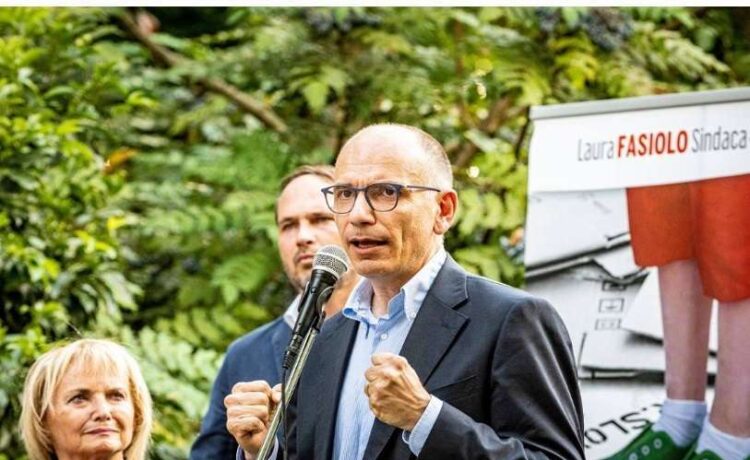The IV National Congress of Civil Society, which was organized by the Civil Society Now Association (SOCIA) was held in Seville this past week and was inaugurated by Aldo Olcese, president of the National Association Civil Society Now (SOCIA) and president of the congress.
It featured a special intervention by Enrico Letta, former Italian Prime Minister and author of the report ‘Much more than a market’ on the future of the Single Market.
Enrico Letta, who was prime minister of Italy in 2013 and 2014, will soon move to Madrid as the new dean of the IE School of Politics, Economics and Global Affairs.
A year ago he was commissioned by the European Council and the European Commission to prepare a report on the future of the single market – ‘Much more than a market’ – which he presented last April and the contents of which he is now explaining throughout Europe. The report sets out the difficulties that are currently surfacing in making progress in the single market and proposes possible solutions, some of them very disruptive.
As the Italian politician explained in a recorded intervention, the core part of his report is related to the fact that, in the creation of the European Single Market in the 1980s, political leaders decided to leave out three main issues that are crucial for the competitiveness of the union: the integration of financial markets, telecommunications and energy. To these three elements, Letta adds a fourth that is highly topical: defense.
In his view, the fact that it is national authorities that have powers over these three markets is part of the EU’s lack of competitiveness. “This fragmentation is making the U.S. industrial system, Wall Street, China, India, the BRICs… happy, because it is giving them a lot of opportunities. And there are many examples of this in the report I presented, but the key point is that, if we want to be competitive, we have to integrate in these three areas,” he stressed.
Continuing his reasoning, he stressed that if the EU is not able to integrate financial markets “it will be impossible to use private investments to lead the most important mission it has today, which is how to finance a digital, green and just transition. This is a very demanding choice that we have decided to make in recent years”.
Precisely on this issue he wanted to be blunt: “I want to be very clear: I believe that this transition is the right choice, but I also believe that we have to finance this transition and we have to accompany it economically, politically and socially. Otherwise, the costs will be unbearable.”
The Savings and Investment Union
Faced with this challenge, Enrico Letta makes an innovative proposal in his report: the Savings and Investment Union, a space to replace the former Capital Markets Union: “The idea is to provide savings and investments for the transition, giving the possibility for it to be financed by both private and public investments.”
Despite acknowledging that it is a complicated issue, he believes that it is the only way to find an agreement among the 27 EU member countries: “We agree, however, that a new Next Generation fund style instrument could work.”
During his speech he also referred to two other central proposals included in the ‘Letta Report’. The first is the definition of a ‘fifth freedom’ in the EU. “Until now, we had the single market of the four freedoms: goods, services, capital and people. But it is very much based on 20th century economics. In reality, we need to invest in innovation and knowledge” he said.
The other key issue, which is very disruptive, is the idea of creating what he calls “a virtual 28th state”.
As he explained, it would be about creating a kind of state with its own commercial law, a kind of European-style Delaware, but virtual, with the idea of unifying in an optional way the commercial laws of the countries to help companies to work in a unified and simplified system without annulling the different national commercial systems, something that he believes is “impossible”. “We would be giving companies, large and small, and foreign investors a choice, a kind of passport to be able to work in a unified and simplified system without bureaucracy, in a very simple way.”
In conclusion, Enrico Letta summed up his report: “This is not a set of ideological solutions, but pragmatic solutions because today we need pragmatism and solutions to relaunch the European Union. I wanted to write a report that included a red alert: The European Union, in economic terms, is lagging behind, it is losing ground in relation to the United States. We have to reset and reboot the EU with the help of our greatest treasure, which is none other than our single market.”
Inauguration by Aldo Olcese
The inauguration of the IV National Congress of Civil Society was led by Aldo Olcese, president of Asociación Nacional Sociedad Civil Ahora and president of the Congress Organizing Committee; Pilar Blanco, academic director of the IV Congress, first vice-president and minister of Finance and Public Administration of the Regional Government of Extremadura (2015-2023), professor of International Law at the University of Seville; Alfredo Rocafort, president of the Royal European Academy of Doctors -RAED-; Juan Antonio Marín, president of the Economic and Social Council of Andalusia; and Antonio Pulido, president of the Cajasol Foundation.
In his speech, Aldo Olcese recalled the origins of the National Association of Civil Society, the sum of thirty foundations, associations, institutions and institutes of thought that came together to organize these Civil Society Congresses, which this year celebrates its fourth edition.

More than 300 top-level speakers from Civil Society have participated in these meetings with common values, independence and altruistic contribution, with a clear purpose: to help improve Spain.
He went on to explain why the motto ‘The Spain that leads’ has been chosen for this IV National Congress of Civil Society. “After the first three, in which the objective was to rethink, relaunch and regenerate Spain, we believe that this is a good time to be able to inspire a certain pride of belonging to our country. At a time when the political moment is very brassy, very acidic, where Spain is being used as a throwing weapon, it does not deserve that citizens think that Spain is not a great country.”
“Spain is a world leader in tourism of course, but it is also a world leader in culture, sports, gastronomy, sustainability, infrastructure or finance. All this is not the result of chance, nor is it the result of one day one government doing one thing and another doing another. It is the sum of what all governments have done and what all Spaniards have done to bring Spain to where it is, which is where it is. And by this I do not mean a country that is not a passive subject of the transformation of the world, it is one of the main actors of the transformation that the world is undergoing and contributing in the positive part”, Aldo Olcese underlined.
Finally, he referred to the fact that this IV Congress is being held in Seville: “Spain is a welcoming country. We have chosen Seville and Andalusia because today you are a magnificent example. Surely the best example in Spain of this symbiosis between welcome, openness, modernity, promotion of initiatives, it is a land of promise, of opportunities, it is a land that everyone wants and that is why we are here”.
For his part, Antonio Pulido stressed that Spain is a society and a democracy of reference that must take advantage of all its strengths to advance and improve. “From the Cajasol Foundation we always insist that there is no better instrument for development than collaboration between the private and public sectors, consensus and the will to unite over differences, as we Spaniards have demonstrated very well in other historically equally challenging situations”.
The Congress was structured in six round tables integrated in three sessions that will address very relevant issues in which Spain occupies a predominant position in the world: “A leadership in quality of life”, “A sustainable and humanistic leadership” and “Competitive and efficient leadership”.
The meeting also included an inaugural plenary session on “The Spanish way of life and Spain’s competitive position”, and a closing session on “The great challenges and opportunities for Spain”.
Throughout the day about 60 prominent exponents of the Spanish and Andalusian Civil Society participated in the debates. As we have reported in Atalayar, among others, José Luis Sanz, Mayor of Seville, and Juanma Moreno, President of the Junta de Andalucía.














